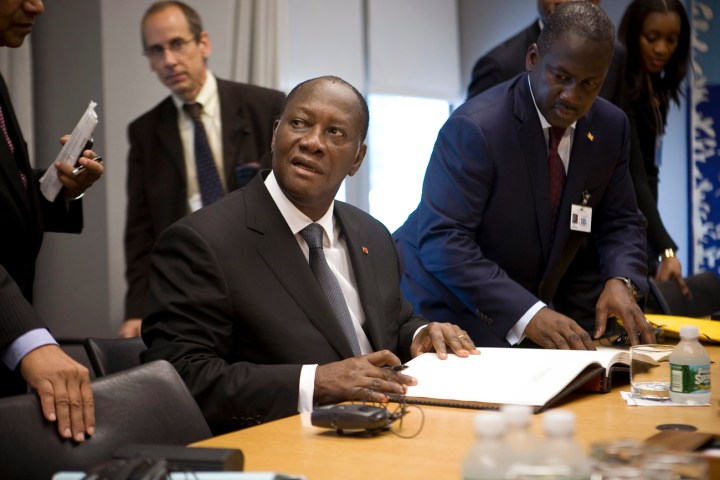Africa
The ICC in Côte d’Ivoire: Alassane Ouattara’s big test looms

The sort of machinations and talks that will culminate in an inquiry by the International Criminal Court into the Côte d'Ivoire post election violence is now underway. There’s a whole lot that can go wrong, so hold your breath on this one. President Alassane Ouattara has not had to face stiff calls to account for his side’s alleged war crimes and the possibility that he won’t deliver on his promise of absolute transparency and justice is possible. BY SIPHO HLONGWANE.
International Criminal Court prosecutor Luis Moreno-Ocampo arrived in Côte d’Ivoire on Saturday to begin talks with officials. The prosecutor seeks to investigate allegations of war crimes and crimes against humanity that took place during the brief civil war following the November 2010 elections.
“In his application to the judges for authorization to investigate possible war crimes and crimes against humanity, Moreno-Ocampo cited sources who said at least 3,000 people were killed, 72 people disappeared and 520 others were subject to arbitrary arrest and detentions since the November 28 election that resulted in dispute,” CNN said. “The prosecutor presented his application and June and this month received permission to open an investigation.”
After the 28 November elections, the incumbent Laurent Gbagbo refused to step down. Results posted by the electoral commission, and endorsed by observers from the United Nations, the United States and the European Union declared Alassane Ouattara to be the winner. The Constitutional Council – packed to the rafters with Gbagbo’s allies – overturned the ruling by nullifying Ouattara’s votes in the north, his traditional support base.
The matter was at an impasse for a while, and then heavy fighting broke out when the Forces Républicaines de Côte d’Ivoire (FRCI) and sometimes called The Forces Nouvelles de Côte d’Ivoire, a former rebel army aligned with Ouattara, began a massive push from the north towards the capital Yamoussoukro, and the economic heart Abidjan. Some of the worst casualties were experienced in Abidjan, where the suburbs populated by northerners (assumed to be Ouattara supporters) like Abobo and Cocody were shelled by Gbagbo’s militias.
Abidjan eventually fell, and Gbagbo along with his aides was arrested in April.
From the outset, Ouattara faced a difficult task to unite his country and begin repairing it. Gbagbo cynically exploited the country’s ethnic and religious divides to try and turn public sentiment against Ouattara. The Côte d’Ivoire civil war that ended in 2007 was fought along ethnic lines and part of the agreements following the ceasefire was that efforts would be made to heal the north-south divide.
One of Ouattara’s repeated promises was that nobody would be spared when it comes to probing the violence. The new Côte d’Ivoire government established a Truth, Reconciliation and Dialogue Commission and charges have already been levelled against top Gbagbo aides and allies.
However, organisations have been quick to point out that while Ouattara has been diligent in pursuing friends of Gbabgo, he hasn’t been as keen to go after his own allies accused of war crimes.
Human Rights Watch said, “No one from Ouattara’s camp had yet been arrested for abuses committed during the post-electoral conflict. There is a growing divide between the Ouattara government’s rhetoric that no one is above the law and the reality that justice appears one-sided and delayed.”
Others have warned that unless Ouattara acts against his own friends, it will be impossible to heal divides.
The prime minister and defence minister Guillaume Soro is the head of the FRCI. Without Soro, Ouattara would not be in power. If the prime minister expresses reluctance to allow his generals to face trial and sanction for their alleged crimes, then the public distrust in the government will only deepen, this time with the south feeling aggrieved. Côte d’Ivoire will be back where it started again.
Now inject Moreno-Ocampo and the ICC into this situation, and the potential for things going very wrong suddenly becomes very real. However, the ICC prosecutor does have the blessing of Ouattara.
He said in a statement, “I am grateful to President Ouattara for extending the invitation for me to conduct an official visit to Côte d’Ivoire. We will also meet members of the opposition. We will meet with victims, and listen to their views and concerns.”
Côte d’Ivoire is not a member of the ICC, but accepted the court’s jurisdiction in this case.
There is no word yet about who exactly may someday sit in The Hague and face a judge. It may even be a while before Gbagbo himself faces the ICC – Côte d’Ivoire itself may want to have a go at him before others do. DM
Read more:
- ICC begins Ivory Coast war crimes investigation in CNN News;
- Côte d’Ivoire’s Ouattara and two sides of the reconciliation coin in Daily Maverick;
- Ouattara’s twin challenges of Côte d’Ivoire’s recovery and forgiveness in Daily Maverick.
Photo: REUTERS




















 Become an Insider
Become an Insider